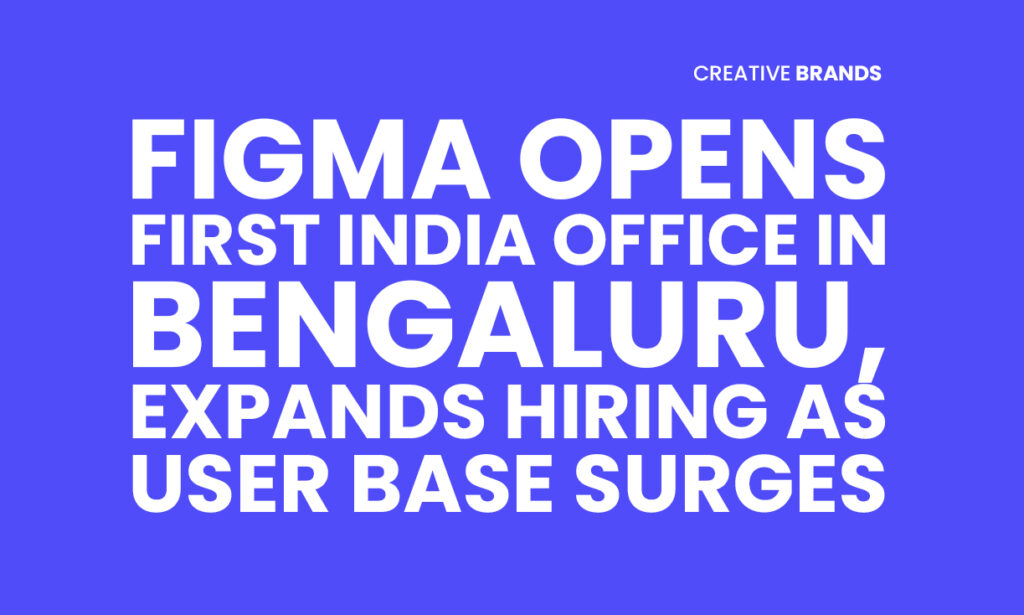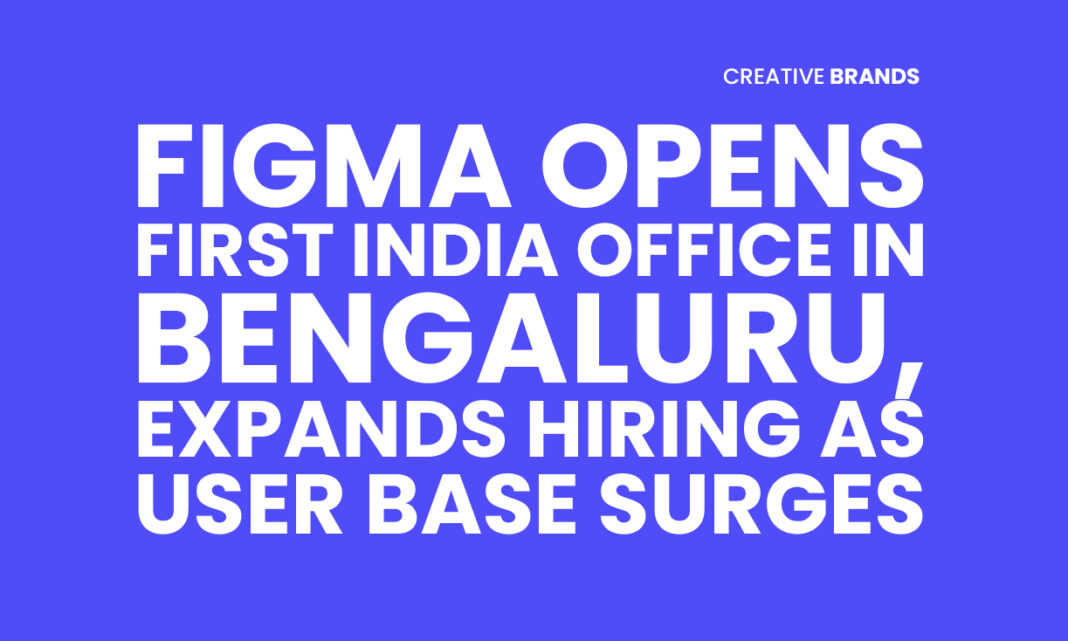Figma has opened its first India office in Bengaluru, marking a major expansion in its fastest-growing market outside the US. With over 40% of BSE100 companies as customers, the design platform is building a local team and strengthening its Asia-Pacific presence after establishing offices in Singapore and Tokyo.

Figma has taken a significant step in deepening its commitment to India’s rapidly growing design and digital innovation landscape with the opening of its first office in Bengaluru. Announced on November 12, the move marks a major milestone for the collaborative design software company, which has seen India emerge as its largest market outside the United States in terms of users. For a platform built on democratising design, streamlining collaboration and enabling real-time creativity, establishing a physical presence in the country signals both strategic expansion and a recognition of India’s increasingly influential role in global digital transformation.
The new Bengaluru office places Figma among a growing list of American technology companies expanding operations in India, drawn by a combination of talent availability, market potential and the country’s accelerating adoption of design-driven product development. Long considered the technology capital of India, Bengaluru has seen continued growth as a hub for engineering, user experience design, software development and startup innovation. For Figma, whose core product thrives on collaboration between designers, developers and product teams, the city offers a vibrant environment where design thinking and digital craft are becoming central elements of business strategy.
India’s importance to Figma has been expanding steadily over the past few years. The company revealed that more than 40 percent of the top BSE100 companies now use its platform, reflecting an increasing shift toward cloud-based collaboration tools and a more mature understanding of user experience as a competitive differentiator. From financial services to telecom, consumer brands to enterprise technology firms, Indian companies are integrating digital design into every stage of product development and customer engagement. This rapid evolution has positioned India not just as a user base, but as a market where design influences core business outcomes.
Figma’s decision to open an India office builds on this momentum while strengthening its footprint across the Asia Pacific region. The company already operates offices in Singapore and Tokyo, and the Bengaluru workspace now joins this network, allowing Figma to better serve regional customers, support its growing community and collaborate more closely with local organisations. For a product that has become indispensable to designers, product managers, engineers and content creators, proximity to its fastest-growing user base enables more tailored support, cultural alignment and deeper market engagement.
The company has also begun hiring for local roles, although it has not disclosed specific details on team size or future expansion plans. Positions currently listed on its careers page include sales and marketing roles—an indication that Figma is prioritising local business development and customer engagement as foundational steps. It is a familiar approach for global software companies entering India: build a team that can understand market needs, scale enterprise partnerships, engage with educational ecosystems and grow the community through localised outreach. For Figma, which has cultivated one of the strongest global design communities, hiring in India aligns with its goal of empowering more users, supporting enterprise adoption and integrating itself into the country’s digital design culture.
The Bengaluru office is expected to act as a bridge between the fast-growing Indian ecosystem and Figma’s global innovation centres. While the company has not yet indicated whether it plans to build engineering or product teams in India, industry observers widely view the move as a foundation for future expansion. India’s talent pool is among the world’s largest for design, engineering, UI/UX and digital product development—a combination that aligns with Figma’s product and growth trajectory. The company’s presence in Bengaluru will also allow it to engage more directly with universities, design schools, tech accelerators and developer communities, strengthening its grassroots ecosystem.
Figma has grown from a promising startup to one of the world’s most widely adopted design tools, redefining how teams collaborate on digital products. Its core offerings—Figma Design, FigJam and Dev Mode—have rapidly become essential tools for creating interfaces, brainstorming, prototyping and bridging handover workflows between designers and developers. The platform stands apart for its browser-based simplicity, real-time collaboration features and ability to scale from individual freelancers to large enterprises. As remote and hybrid work flows continue across industries, collaborative design tools like Figma have become integral to how companies build digital experiences.
In India, this shift has been particularly pronounced. Startups, which once viewed design as a function secondary to engineering, have embraced design as a foundation of good product development. Meanwhile, enterprise organisations are undergoing aggressive digital transformation, creating internal design systems, revamping legacy interfaces and building customer-centric digital services. Figma has been a crucial enabler of these changes. Its ease of use, intuitive interface and compatibility with cross-functional workflows have accelerated adoption across teams, even in companies new to design tooling.
The establishment of a permanent presence in India also allows Figma to better understand the specific challenges faced by its users in the region. Localised support is increasingly essential as Indian enterprises scale their design operations, build larger design teams and adopt more sophisticated workflows. Additionally, India’s design community is one of the most energetic and diverse in the world, with thousands of students, freelancers and professionals participating in workshops, meetups and online communities dedicated to UI/UX and product design. Figma has become the platform of choice for many within this network, and a physical office strengthens its connection to this vibrant ecosystem.
The move comes at a time when competition in the design software space is intensifying. Companies like Adobe, Canva and Sketch are expanding offerings, exploring AI-based features and building integrated tools that connect design with content, development and workflows. Figma, which has already introduced AI-powered enhancements and expanded integrations, sees India as a market where these innovations could accelerate adoption and unlock new use cases. With businesses across sectors—from fintech to education, healthcare to e-commerce—investing in digital-first experiences, Figma’s presence positions it to be a strategic partner across industries.
Beyond its commercial outlook, the Bengaluru office signals Figma’s belief in India’s long-term role as a global centre for design excellence. As design becomes more embedded in the core of business strategy and customer experience, India’s contribution is expected to grow in influence. By establishing local operations, Figma not only supports its existing user base but invests in shaping the next era of design-led innovation in the country.
For the design community in India, the announcement is a milestone that reinforces the growing international recognition of the country’s talent and creative capabilities. It also opens doors for collaborations, mentorship, training programs and industry events that will further cultivate local expertise. With Figma now physically present in Bengaluru, the relationship between global design innovation and Indian creativity is poised to deepen in ways that shape not only digital products but the broader future of how teams around the world collaborate and create.
Figma’s first India office represents more than an expansion—it is an acknowledgment of where the future of design is unfolding. And as the company begins building its local team and strengthening its regional presence, Bengaluru becomes a crucial node in its global mission to make design accessible, collaborative and transformative for everyone.
Discover more from Creative Brands
Subscribe to get the latest posts sent to your email.






